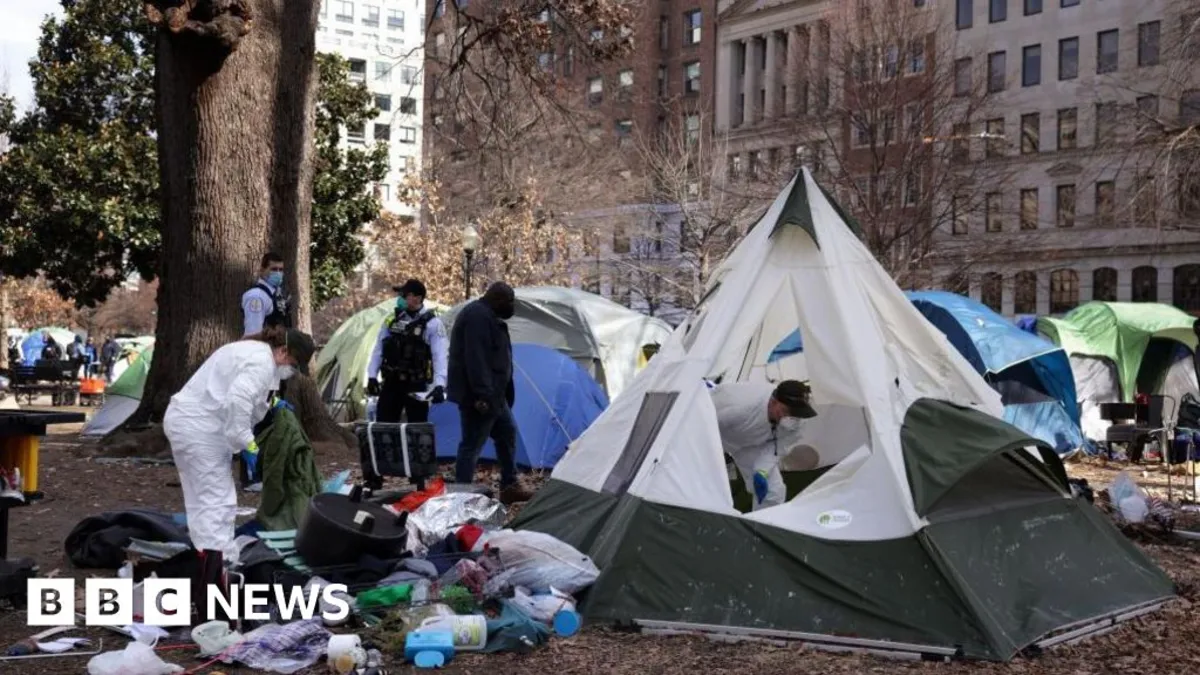
US President Donald Trump has made headlines by demanding that homeless individuals vacate Washington DC, pledging to confront the rising crime rates in the capital. In a recent post on his social media platform, he stated, “We will give you places to stay, but FAR from the Capital,” emphasizing his commitment to tackling crime and improving the city’s environment.
In response, Mayor Muriel Bowser, a Democrat, challenged Trump's assertions, stating, “We are not experiencing a crime spike.” This disagreement highlights the contrasting perspectives on crime and homelessness in the district, especially as Trump prepares for a news conference scheduled for Monday to unveil his strategy for making Washington DC “safer and more beautiful than it ever was before.”
Last month, President Trump signed an order that facilitates the arrest of homeless individuals in the city. Recently, he called for federal law enforcement to take action on the streets of Washington DC. “The Homeless have to move out, IMMEDIATELY,” Trump declared on his platform, Truth Social. He further stated that criminals would face incarceration, asserting that “There will be no 'MR. NICE GUY.' We want our Capital BACK.”
Although the specifics of Trump’s plan remain unclear, it echoes proposals he made in 2022. He suggested relocating homeless individuals to high-quality tents situated on affordable land outside urban areas, ensuring access to essential facilities like bathrooms and medical care.
In a bid to address crime, Trump deployed federal agents, including personnel from the US Park Police, Drug Enforcement Administration, FBI, and US Marshals Service, to Washington DC. A White House official revealed that up to 450 federal officers were dispatched to the city on a Saturday night. This action follows a concerning incident involving a 19-year-old former employee of the Department of Government Efficiency (Doge) who was assaulted during an alleged attempted carjacking.
In an interview with MSNBC, Mayor Bowser acknowledged a significant rise in crime in 2023, but emphasized that the city has effectively reduced violent crime to a 30-year low over the past two years. She criticized the White House deputy chief of staff, Stephen Miller, for inaccurately comparing Washington DC to Baghdad, stating that such claims are “hyperbolic and false.”
Despite concerns, Washington DC's homicide rate, which has seen a total of 98 killings this year, remains high compared to other US cities. However, federal data indicates that the overall violent crime rate in the capital was at its lowest in 30 years in 2022 when accounting for various offenses such as carjackings, assaults, and robberies.
Trump has announced that he will hold a news conference at the White House on Monday at 10:00 EDT (14:00 GMT) to discuss strategies for combating crime, including murder and death in the city, as well as plans for urban renewal. He acknowledged Mayor Bowser’s efforts but criticized her for the ongoing crime issues and the city’s deteriorating conditions.
According to Community Partnership, an organization dedicated to reducing homelessness in Washington DC, approximately 3,782 individuals face homelessness on any given night in the city of 700,000 residents. While most are sheltered in public housing or emergency facilities, around 800 individuals are classified as living on the streets.
As Washington DC is designated as a district rather than a state, it is subject to federal oversight, which allows the federal government to override certain local laws. Although President Trump controls federal properties and buildings in the city, he would require Congressional approval to assume full federal control over the district. Recently, he hinted at the possibility of taking over the Washington DC Metropolitan Police Department, a move that Mayor Bowser contended is not legally feasible.
In summary, the ongoing dialogue between President Trump and Mayor Bowser illustrates the complexities surrounding homelessness and crime in Washington DC. As the president prepares to announce his plans, the city remains a focal point of national discussions on public safety and social services.